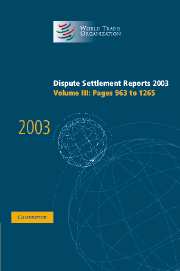Book contents
- Frontmatter
- Contents
- European Communities – Anti-Dumping Duties on Imports of Cotton-Type Bed Linen from India – Recourse to Article 21.5 of the DSU by India (WT/DS141): Report of the Appellate Body
- Argentina – Definitive Safeguard Measure on Imports of Preserved Peaches (WT/DS238): Report of the Panel
- United States – Continued Dumping and Subsidy Offset Act of 2000 (WT/DS217, WT/DS234): Award of the Arbitrator under Article 21.3(c) of the DSU
- Canada – Export Credits and Loan Guarantees for Regional Aircraft (WT/DS222): Decision by the Arbitrator under Article 22.6 of the DSU and Article 4.11 of the SCM Agreement
- Chile – Price Band System and Safeguard Measures Relating to Certain Agricultural Products (WT/DS207): Award of the Arbitrator under Article 21.3(c) of the DSU
- Cumulative Index of Published Disputes
European Communities – Anti-Dumping Duties on Imports of Cotton-Type Bed Linen from India – Recourse to Article 21.5 of the DSU by India (WT/DS141): Report of the Appellate Body
Published online by Cambridge University Press: 13 December 2017
- Frontmatter
- Contents
- European Communities – Anti-Dumping Duties on Imports of Cotton-Type Bed Linen from India – Recourse to Article 21.5 of the DSU by India (WT/DS141): Report of the Appellate Body
- Argentina – Definitive Safeguard Measure on Imports of Preserved Peaches (WT/DS238): Report of the Panel
- United States – Continued Dumping and Subsidy Offset Act of 2000 (WT/DS217, WT/DS234): Award of the Arbitrator under Article 21.3(c) of the DSU
- Canada – Export Credits and Loan Guarantees for Regional Aircraft (WT/DS222): Decision by the Arbitrator under Article 22.6 of the DSU and Article 4.11 of the SCM Agreement
- Chile – Price Band System and Safeguard Measures Relating to Certain Agricultural Products (WT/DS207): Award of the Arbitrator under Article 21.3(c) of the DSU
- Cumulative Index of Published Disputes
Summary
INTRODUCTION
India appeals certain issues of law and legal interpretations in the Panel Report, European Communities – Anti-Dumping Duties on Imports of Cotton- Type Bed Linen from India – Recourse to Article 21.5 of the DSU by India (the “Panel Report”). The Panel was established to consider a complaint by India with respect to the consistency with the Agreement on Implementation of Article VI of the General Agreement on Tariffs and Trade 1994 (the “Anti- Dumping Agreement ”) and the Understanding on Rules and Procedures Governing the Settlement of Disputes (the “DSU”) of the measures taken by the European Communities to comply with the recommendations and rulings of the Dispute Settlement Body (the “DSB”) in EC – Bed Linen.
The original panel found that Council Regulation (EC) No 2398/97 of 28 November 1997, imposing definitive anti-dumping duties on imports of cottontype bed linen from India, is inconsistent with Articles 2.4.2, 3.4, and 15 of the Anti-Dumping Agreement. India and the European Communities appealed certain issues of law and legal interpretations developed by the original panel. The Appellate Body upheld the original panel's finding that “the practice of ‘zeroing’ when establishing ‘the existence of margins of dumping', as applied by the European Communities in the anti-dumping investigation at issue” is inconsistent with Article 2.4.2 of the Anti-Dumping Agreement. In addition, the Appellate Body found that “the European Communities, in calculating amounts for administrative, selling and general costs and profits in the anti-dumping investigation at issue”, had acted inconsistently with its obligations under Article 2.2.2(ii) of the Anti-Dumping Agreement and, therefore, reversed the findings of the original panel to the contrary in paragraphs 6.75 and 6.87 of the original panel report.
On 12 March 2001, the DSB adopted the Appellate Body Report and the original panel report, as modified by the Appellate Body Report. The parties to the dispute mutually agreed that the European Communities should have until 14 August 2001 to implement the recommendations and rulings of the DSB.
- Type
- Chapter
- Information
- Dispute Settlement Reports 2003 , pp. 965 - 1036Publisher: Cambridge University PressPrint publication year: 2005
- 2
- Cited by



